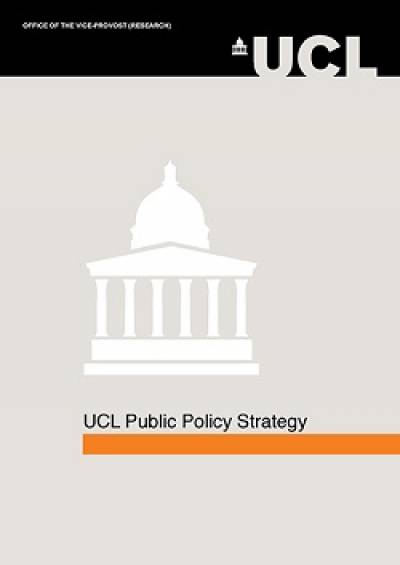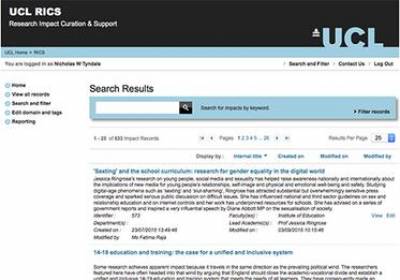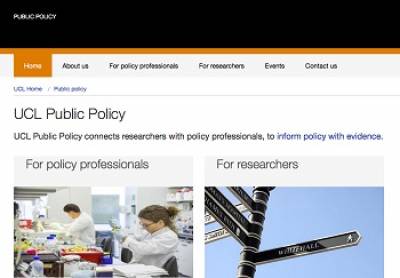Bringing expertise to bear on policymaking
19 May 2016
I have occasionally fallen asleep listening to UCL academics.
 Happily, it is more
common for me to wake up to the sound of their voices, quite often
explaining how government decisions might be improved if only they were
informed by evidence. (BBC Radio 4 acts as my morning alarm.)
Happily, it is more
common for me to wake up to the sound of their voices, quite often
explaining how government decisions might be improved if only they were
informed by evidence. (BBC Radio 4 acts as my morning alarm.) It's
not surprising that a university like ours, generating significant amounts of new
knowledge and evidence, frequently finds its experts appearing on authoritative media
such as the Today programme. This activity
undoubtedly helps to shape public debate. Over the last four years, however, I
have been considering how our university can more directly inform the development
of effective and equitable public policy.
There's a lot to learn from what my academic colleagues are already accomplishing. Here are a few recent policy interventions which were built on their research:
- helping thousands of people stop smoking through evidence-based NHS programmes
- developing community group interventions that improve maternal and newborn health in Nepal and India
- establishing the UK national minimum wage
- expanding anti-retroviral treatment in developing countries.
Luckily for me, as Vice-Provost with responsibility for supporting this kind of activity, they signify only a very small subset of our policy-related accomplishments.
Timely interventions
The social benefits of well-designed policies are significant and often enduring. Therefore, public policy is one arena in which UCL must operate effectively if it is to fulfil UCL 2034's renewal of our commitment to partnerships through which our expertise is applied to significant problems.
Indeed, the implementation of UCL 2034 coincides with enhanced opportunities for universities to engage with policymakers. This makes it timely to reflect upon how we present ourselves to those with the challenging task of delivering policy responses to increasingly complex problems.
Around the world, academic expertise is highly valuable to policymakers and policy professionals, and we have seen a growing emphasis in the UK government and parliament on the use of evidence in policy development. Furthermore, the Civil Service Reform Plan is encouraging 'open policymaking', involving greater transparency, collaboration and engagement with evidence and experts. Most government departments and public bodies have reduced their internal research budgets, a trend unlikely to be reversed in the medium term; however, their demand for research and evidence addressing societal problems remains undiminished.
These factors offer significant opportunities to increase academic engagement with policy. It is, however, not an unproblematic terrain. For example, the government's 'anti-lobbying' proposal put forward earlier this year could have prevented government research grants from being used to "support activity intended to influence or attempt to influence Parliament, government or political parties … or attempting to influence legislative or regulatory action". Alongside many universities and sector groups - notably, the Campaign for Science and Engineering (CaSE), chaired by UCL's Professor Graeme Reid - we appear to have persuaded the government that such a move would undermine academic autonomy and (perversely, given the extent to which 'research impact' has been championed by the government) prevent the policy- and law-making communities from benefiting from researchers' insights.
UCL's potential
UCL is well-positioned to respond to the appetite for evidence, due to the quality and breadth of our research and expertise, our ethos of utilitarianism, our proximity to Westminster and our considerable track record of engagement with policy. We also have a high number of academics serving in policy advisory roles, and former policymakers appointed into our departments, further strengthening our expertise and ability to engage with policymakers.
Our submission to the Research Excellence Framework (REF) 2014 made clear the widespread and long-term efforts by UCL academics across the disciplines to bring their research to bear on matters of public policy. More than 30% of our impact case studies - selected for their 'reach and significance' - were about influencing public policy. (You can browse these and many more impact case studies at the UCL Research Impact Curation & Support database.)
UCL's REF results testify to our profound influence on legislation, regulation and policy debate.
A pan-institutional approach
It is entirely appropriate for these activities to be academic-led. Yet how best can the institution add value to the effective policy engagement already underway?
Our approach, taken forward by UCL Public Policy (led by Sarah Chaytor in my office), can be characterised as follows:
- 'expert-to-expert' contact - helping to connect individual researchers, groups, departments and faculties directly with those policymakers who can benefit from their knowledge. There are other models, usually involving the establishment of a large units to act as 'one-stop shops'; we prefer to think of UCL Public Policy as a portal to our experts
- drawing on UCL's collective expertise - consonant with the UCL Research Strategy's emphasis on the benefits of cross-disciplinarity, UCL Public Policy's pan-institutional perspective allows it to bring together experts from varied disciplines, in order to address policy questions in their full complexity.
UCL Public Policy adopts an overview of policy engagement, maintains a knowledge of our university's capacity to address policy issues and provides space for brokered relationships between academics and policymakers. It offers UCL as a reliable, effective and trustworthy partner, and presents it both as greater than the sum of its parts and as a source of 'disruptive thinking' (this being another of UCL 2034's aspirations). It is developing UCL's profile as an institution which is engaged with policy at many levels and across many policy issues.
Our approach is distinctive (and needs to be, as other universities ramp up their policy engagement) and plays to UCL's great strengths. You'll find more detail on it in the refreshed UCL Public Policy Strategy, along with much more at the new UCL Public Policy website.
Support for researchers
The UCL Public Policy team has considerably expanded its offer to staff and postgraduates, including:
- guidance (password-protected) on aspects of public policy engagement
- one-to-one advice surgeries
- an annual small grants programme (the first awards were made recently; the next call will be in autumn 2016)
- the Up Close and Policy series, to hear from academics and policymakers on their experience of engagement
- Behaviour Change Clinics, where researchers can 'troubleshoot' policy problems
- dedicated support for the BEAMS School (Dr Olivia Stevenson), provided through our EPSRC Impact Acceleration Account.
UCL Public Policy continues to offer placements for researchers in policy organisations, a public events series - such as the recent 'UCL Question Time on London's Housing Crisis' - and high-level research summaries through UCL Research Insights. Additionally, UCL Public Policy can provide other support for your policy engagement activities, such as helping to convene policy roundtables and meetings, or advising on Select Committee submissions.
If you
think there's anything missing from this portfolio of support, please let
the team know.
Building on recent policy work
There remain significant barriers to academic engagement with the policy sphere, not least cultural differences and a lack of understanding of the best routes for engagement. UCL Public Policy can help to bridge the gaps between those two communities, and to convey research insights in ways that policymakers will recognise as relevant.
Over the past few years, we have developed our relationships with government departments and agencies, including BIS, DECC, Defra, the Government Office for Science and the Food Standards Agency, adding to those many strategic relationships which are built by individual researchers and increasing opportunities for UCL research to inform policy. We have produced policy reports such as Greening the Economy - which in particular has influenced Government policy on resource use and waste management - and Time for Change? - which has led to a renewed focus on the communication of climate science.
We have arranged policy placements for more than 35 UCL research students and staff into government departments, creating valuable networks and directly contributing to policy development.
We've also created the UCL Public Policy Board, with a senior representative from each faculty, to work with us on improving our picture of UCL's strengths, augmenting our activity and identifying opportunities to enhance UCL's policy impact even further.
UCL needs to recognise the continuing challenges we will face in engaging in policy, including the pragmatic (limited capacity and resource) and the cultural (willingness on both sides to engage). Key to success will be deepening our understanding of the policy landscape, of policymakers and of how evidence is used in the policy process - which is complex, messy, multi-layered and often impenetrable.
UCL Public Policy will continue to enhance UCL's already significant capacity in this area in order to increase our engagement and impact. In the next five years, we intend to increase our academics' interactions with policy professionals, expand our policy-focused outputs and improve our ability to respond to policy demand for academic expertise. We would be delighted if you would like to explore being part of this activity.
Professor David Price, UCL Vice-Provost (Research)
Comments? Please provide your thoughts through this form
Images, from top to bottom:
1) UCL research has informed community group interventions that improve maternal and newborn health in Nepal and India
2) The UCL Public Policy Strategy
3) A screenshot of the UCL Research Impact Curation & Support website
4) A screenshot of the newly launched Public Policy website
 Close
Close





